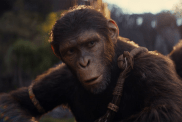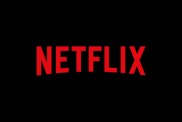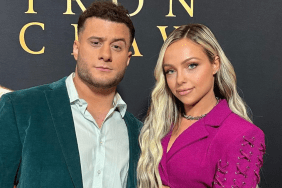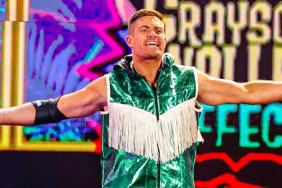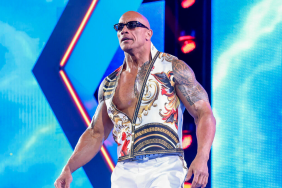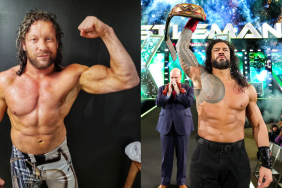The big buzz on the festival circuit this year is Darren Aronofsky’s fourth movie The Wrestler, which has garnered many fans since debuting at the Cannes Film Festival back in May before playing the Venice and Toronto film festivals last month, the former where it won the coveted Golden Lion for the director and the latter where it was picked up for distribution by Fox Searchlight.
Much of the buzz has centered around the comeback performance by Mickey Rourke as Randy “The Ram” Robinson, a has-been wrestler who twenty years after his heyday is still wrestling and doing irreparable damage to his body. After a life-threatening heart attack, it seems doubtful “The Ram” will fight again, but can he adjust to life among the “normal” people of New Jersey? Rourke gives a heart-rendering performance, but he’s equally impressive with the way he built up a credible physique to portray a wrestler, and his moves in the ring are just as impressive. Marisa Tomei co-stars as a stripper with the proverbial heart of gold that Randy takes a shine to, and Evan Rachel Wood plays Randy’s estranged daughter with whom he’d like nothing better than to reconcile now that he may never wrestle again.
On Sunday, October 12, Aronofsky’s latest movie will close the 46th New York Film Festival, playing at the New York’s largest and most prestigious theater, the Ziegfeld. Last week, Aronofsky, Rourke, Tomei and producer Scott Franklin were on hand to field questions from the press, and there has never been a New York Film Festival press conference as entertaining as this one. (If you so choose, you can watch a few selected clips from the press conference in video format on the Official Site.)
Question: Darren, can you talk about the genesis of the project?
Aronofsky: When I graduated film school, I had made a list on my Mac Classic, just some ideas for feature films, and one of them was called “The Wrestler.” I think it came out of the idea that there are so many boxing movies, that it’s basically its own genre, and no one had done a serious movie about wrestling. There’s a lot of reasons for that… but, so it started there, and it just kind of sat on my hard drive for years, and then about six years ago, me and Scott Franklin, who was a producer on a couple of my earlier films, started talking about it, and Scott turned out to be a bigger fan of wrestling than I was–when he was a kid (laughs)–and Scott started to put together some ideas for it, and then eventually the idea of Mickey Rourke came up, and at that same time, we met a writer named Robert Siegel, and so Rob started to write a script, and the project started to fuse. That kind of big part of it was the last two years.
Q: Can you talk about how you used Mickey’s breathing, the grunts and moans, as part of the soundtrack in creating the environment for Mickey’s character?
Rourke: To talk about how they designed that, how that was in a certain way, planned, as part of the sound design?
Aronofsky: Well, I can’t talk about the performance, and I’m curious to hear where it came from, because I don’t think I directed that from Mickey. I think that Mickey just brought that, but when I started to edit, you were very aware of it… and it was funny. Mickey hates looping, and told me many times on set, “We will never loop.” But I won that fight! (laughs) I got him to do a few just sort of grunts, and we definitely played with him a little bit, but most of it was captured and recorded on set and done from Mickey in the moment, so I’d love to hear from Mickey where that came from.
Rourke: We had a pretty extensive rehearsal period. I didn’t know much about wrestling at all, and Darren had a really great stunt coordinator, who’s an actual judge at UFC events, a gentleman by the name of Douglas Crosby. He brought in a really great team of professional wrestlers, one particular guy from the ’80s, who was a famous tag team…
Aronofsky: Afa Samoan. Remember the Wild Samoans? He was one of those guys. He’s a really nice guy. (laughs)
Rourke: So while Darren went on vacation for like two months, he made me stay with these guys. He had a ring put up in his office, and every day, for two hours, Darren made me go to wrestling practice with these guys. At first it was really hard, I didn’t get it, because I was formally trained in a different sport, which actually made it harder to learn the wrestling. In boxing, you’re taught to hide everything, so I would have been better off if I’d never had a boxing lesson or fought professionally, because it almost broke every rule that I was ever taught to show a punch, where I was taught for so many years to do that. It seemed very queer to do this, instead of doing that (demonstrates a move). The actual grunting was real. We were pretty exhausted, and Darren is very–he doesn’t like the word tough–but relentless, okay? He’s a perfectionist, and he really wanted us to… a lot in Europe, they get confused, “Oh in America, you make all these boxing movies,” and wrestling and boxing are like, I said, ping pong and rugby. It’s totally two different sports. One sport you really go out and cause as much damage as you can on your opponent as quickly as you can or you pace yourself to do so, to survive, depending on the opponent, where with the wrestling, it’s all choreographed like a ballet, like a dance, and you work with the other person so you can pull off something that looks like, a little magical. What I really didn’t know, and what I wasn’t prepared for, is that you really do get hurt. I got hurt more in the three months doing the wrestling than in 16 years in boxing. I think I had three MRI’s in two months, and ya know, Darren would screech at me, “You’re only giving me 50 percent,” and I’m going, “I can’t f*cking move, brother, ya now, I’m no spring chicken!” This would be hard for a 20 year-old to do. I gotta admit, I didn’t have very much respect for this sport, and I looked down on it, coming from the sport that I was very proud of being a part of for most of my life. Once I got over that hurdle and realized that it’s something else, it’s okay to wrestle, it’s okay to make believe. What I really didn’t know is that I had a new found respect for this sport as far as it being entertainment because these guys lay their ass on the line and get hurt, working off the adrenaline of the audience. So when they’re throwing themselves over the ring or they’re body slamming, they’re hurting every vertebrae in their body and their teeth are rattling, and when they go over and they get hit with the chairs, it does hurt… I was so glad when this movie was over! (laughter) I can honestly, probably say it is the best movie I’ve ever made and the hardest movie I’ve ever made and I was so goddamned thankful the day we were done with it.

Aronofsky: Back to the question… What about the grunting when you weren’t wrestling?
Rourke: I was just tired all the time. (laughter)
Q: Marisa, can you talk about the preparation for your role?
Tomei: I was just listening to Mickey, and I was thinking that there were so many feelings that were similar… although Darren didn’t put up a strip pole in his office for me ahead of time. (laughter) I had to cram it into I guess a few weeks, really, but also I thought well, it’s not really dancing, it’s just about how you look, and then later I found out that, just as Mickey was saying, you’re working off the adrenaline of the audience, you’re entertaining, and that there was a craft to it and a strength to it. It’s difficult. I wound up really enjoying it and learning the tricks and also the personal challenge of standing there and doing that. Its’ one thing when it’s like a fantasy in your mind, my mind, but I always like to go into things that I’m scared of, so I eventually found it… liberating is kind of a trite word, but it was fun. It was scary, but it was still fun, and it was hard, and how many takes did we do, at a time?
Aronofsky: 26.
Tomei: It doesn’t sound that bad now, 26 takes, but at like, two minutes a pop, it’s a really strenuous activity, it was really hard. Plus I’m having a shot between every take. (laughter) Did you know that?
Aronofsky: No.
Tomei: Some of the PA’s on set were in my corner. (laughter)
Q: Were the other dancers pros?
Aronofsky: Yeah. Our whole attitude was to try and stick us in as real environments as possible, so with the wrestling, we actually threw real wrestling promotions with real fans and with all other real wrestlers. In fact, everyone Mickey wrestled was a real wrestler; there were no stuntmen involved. I mean, there was partly a financial element to it, but that wasn’t really the main motivation to it. It was to try and create as much reality as possible.
Q: Mickey, can you talk about how you got your body into the right shape for this role and talk about the make-up effects particularly in the wrestling scenes?
Rourke: I was already working out for something else for three or four months, so once I knew that we were going to do this film, I was sort of in heavy training, to try to put on 36-40 pounds, and I tried to put it on the right way, slowly. I had a little help and I ate a lot of protein and pumped a lot of iron and lifted heavier than I normally lift. I had a terrific trainer from Israel who was a professional cage fighter, and he was really disciplined with me, and he’d come over and yank me out of bed at 7 in the morning; I’d tried to hide under the sheets like I wasn’t there. We worked really hard back in Miami with the weight training and continued it an hour a day, even as we were shooting.
Q: And the makeup effects?
Aronofsky: We had a great makeup team, the team I’ve worked with on all of my films, led by Judy Chen, who’s the script makeup artist, and Mike Marino did the prosthetics and also did the nipple rings, which is harder than you imagine. It’s actually a really difficult thing to pull off. But, yeah, it was just a lot of work, it was probably 2-3 hours of prosthetic work at least, if not more.
Q: When you hired Rob Siegel to write the script, how did you know that you’d get the quality of script out of him that you wanted?
Aronofsky: Rob Siegel was one of the first editors of “The Onion,” and then he wrote a screenplay that made the rounds, a great one that I tried to do for a while; I just kind of liked his dark humor with the drama. This other film was a sports movie, and then when I talked to him I had a sense that he sort of understood what we were trying to do. Then we worked for him with two to three years to shape it, so there was a lot of development. I don’t know how many drafts he wrote, maybe 30 drafts, but it went through a lot of incarnations to get there.
Q: Mickey, how much rehearsal time did you have with Evan Rachel Wood?
Rourke: We didn’t have any. I don’t really like to rehearse, especially when it’s scenes that you gotta kind of revisit dark places and emotional scenes. She was special to work with. She’d go outside, smoke a half a dozen cigarettes, and I’d be doing the same thing. We said, “hello,” to each other…
Aronofsky: No, you didn’t even say, “hello.” The first scene, I stuck her in the house and I said, “Let’s just try it.” Because I knew Mickey didn’t want… we wanted to try it without rehearsing.

Rourke: I have to say I’ve worked with some pretty fine young actresses, and she just blew me away because she would… first of all she’s like 20-something years old and she didn’t have any easy scenes to do, and she would nail it, and then I thought, “Wow, she’s pretty f*cking good.” And then she’d do one or two more takes that were off, and she’d go back, smoke 10 more cigarettes, come back, and nail it again, and I thought, “Wow, who’d she study with, or what technique did she learn, because when I was 20, I couldn’t even remember my lines.” I was very impressed with her.
Q: Scott, can you talk a little bit about the production and how it came together?
Scott Franklin: The film was financed by a company called Wild Bunch. We tried to finance the film for a long time. It was a challenging film to finance. Mickey’s comeback as a lead actor, a lot of people doubted him, and Darren and I never wavered from believing in Mickey, and when the film made its rounds, Wild Bunch was a little bit short in what they were willing to finance it for and how much of a risk they were willing to take, and as we got closer to actually wanting to make the film, I think the Euro kept rising and the dollar kept plummeting, which boded really well for us, in that they were able to finance the film for the same amount of Euros that they originally offered us for, it was about $600,000 more. It just all came together, and once that came together, we ran as quickly as we could to get into production so that the dollar would stay where it was. I think we prepped it in two months, once they first committed to making the film. We shot for 35 days.
Q: Marisa, did the wrestlers or dancers offer to show you their moves and did those scenes allow for any improvisation?
Tomei: They wanted to know my moves! (laughter) They actually did. The ones that were hired, that were on the set, but we did… Darren, I don’t know how he met Misty… (laughter)
Aronofsky: We knew someone that worked in strip clubs downtown… I don’t know who introduced us… (looks at Mickey which causes more laughter)
Rourke: What was her name?
Aronofsky: Yeah, a friend of Mickey’s and a friend of Serafina’s… so anyway, we got someone.
Tomei: And through Serafina we met Misty, and Misty came and hung out with me, so that was mostly how it worked. I was still of course, quite nervous, but Micky made me feel better after the first day, and I was waiting to see his eyes when he came in, “Does this look right? I know you know! Does this look right?”
Aronofsky: I remember Mickey, with his long blonde hair, trying to show her…
Tomei: How to twirl… He showed me how to do that head snap… actually, he [Mickey] taught me! (laughter)
Q: What about Mickey’s wrestling moves?
Aronofsky: As Mickey said, we had a tremendous wrestling team that trained Mickey to do all those moves, everything was choreographed.
Rourke: We were choreographed, and then we had one particular professional wrestler, Tommy Farra. We’d have everything choreographed, and we’d be standing around, huffing and puffing, and then Tommy would do this f*cking crazy move, and I’d go, “Oh, I wanna do that,” and we wouldn’t tell Darren, because we had banned Darren from wrestling rehearsal at the time, so every time Tommy would do something tricky and far out, I’d say, “Oh, I wanna do that move, too.” So I’d come in on Sundays and not tell him [Darren] that we were incorporating these other kind of scissor moves into it, and it was kind of challenging and fun, and by that time I kind of got my head into it and I really wanted to impress Darren.
Q: Was the choreography worked out ahead of time similar to the way they do matches?
Rourke: There will be a set piece that will be choreographed during a certain period of time, but then what we do, is we incorporate a move that wasn’t originally there. In other words, we make it a more exciting move.
Aronofsky: They basically speak a language when they’re wrestling. Some of the things, we weren’t able to capture, like what is it called? A hitting key?
Rourke: A hitting key is like you touch someone and you squeeze them, and that means that they will reverse another move.
Aronofsky: So they are talking to each other and countering, but usually, a character like The Ram, who was a veteran, would just lead the other guy through, just sort of what we showed, and it’s basically improvisational, but they know the big beats that they hit.
Q: Has anyone in the wrestling community seen the movie and how did they feel about you giving away their tricks?

Aronofsky: No one’s really seen it. What I’ve heard so far from the wrestlers who have seen it, the ones that trained Mickey, is that Mickey is probably better than 80 percent of the actual “jobbers” in the WWE right now. I think all of the wrestlers were pretty amazed at what he’s pulled off, which was a big compliment; I was very happy. I think everyone knows that wrestling is entertainment. I think, if anything, what we’re showing, is that it’s an actual sport. We’re showing that it’s a lot of blood and tears.
Rourke: Well, it’s also like any other sport, football, baseball, boxing, where you reach a certain age, because you’re 37 years old, that ball went through your legs, and “Oh, we gotta get another shortshop.” You reach a certain age and they want to put you on the shelf, and some guys don’t go so gracefully, you know? But it happens in every sport. Anybody who’s ever put on a jock strap knows what I’m talking about.
Aronofsky: Or a g-string. (laughter)
Q: If you were called up by the WWE to appear in “Wrestlemania,” would you be available?
Rourke: Absolutely! I hear Vince McMahon pays pretty good.
Q: You used the word “relentless” earlier which seemed appropriate since you were all ruthless in your pursuit in making this film. What do you think is the mass appeal of self-abuse (like wrestling or stripping)?
Franklin: I have no idea. We’re gonna have to leave that to the film critics.
Aronofsky: I don’t know that actors are necessarily looking to hurt themselves when they take a role; I don’t think that’s what driving actors, personally. But I think it’s something I dealt with in “The Fountain” a little bit, challenging death. It’s the whole Gladiator thing: how close to death can you come, like standing off a cliff.
Rourke: I’m gonna relate it to a football coach. I paid Darren a compliment one time, and I said, He was tough. He got upset with me, because where I’m from and he comes from, could mean two different things. I mean tough that, like, “I will break my ass for him, like I would a football coach who’s tough, who’s just gonna run you into the f*cking ground so that when it’s game day you’ll be ready to play.” And that’s what happened with this movie. There was a trust that happened… we were shooting on gas fumes, and Darren was the coach, he was the general, I won’t say, tough, he was not tough, he was relentless, talented.
Q: There was some discussion before about financing and that there was some nervousness about having it star Mickey. Can you talk about that and Mickey, how does it feel to be experiencing a “comeback”?
Rourke: Well, you know, if I knew 15 years ago, that it was going to take 15 years to get back in the saddle and work again because of the way I handled things, I really would have handled things differently. Doing things differently this time around, understanding what it is to be a professional, be responsible, be consistent, those are things that weren’t in my vocabulary back then. Change didn’t come easy for me, until I lost everything, and then I realized, you better change, or you’re gonna blow your f*cking brains out. Either you change or you’re just a piece of sh*t. I thought it was a weakness to change, because of the armor I’d put on my whole life. I’m okay with it now, yeah it took me 15, 16, 17 years out of the game, but it’s really nice, because I get to come back and work with these people here.
While tickets for The Wrestler‘s Closing Night at the 46th New York Film Festival may be presently sold out, the movie is scheduled to open on December 19 and hopefully we’ll have more with Aronofsky, Rourke and Tomei then.

